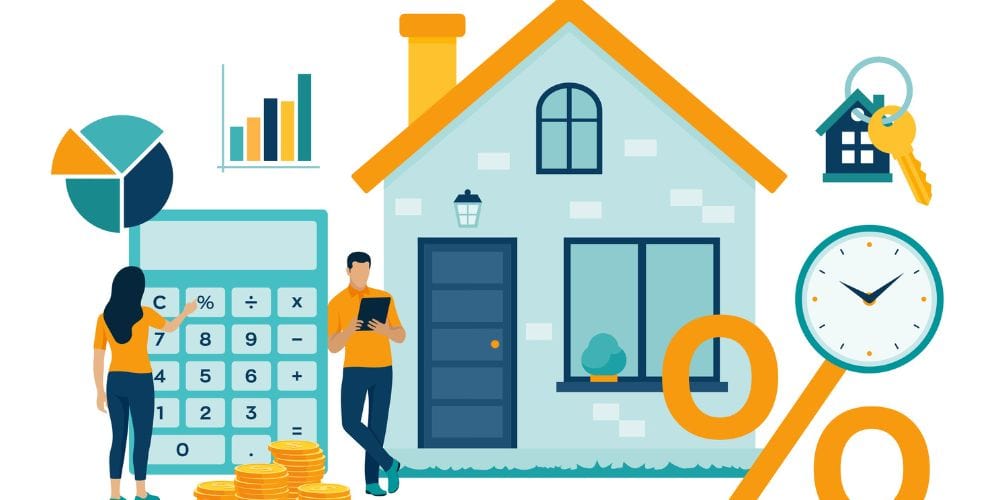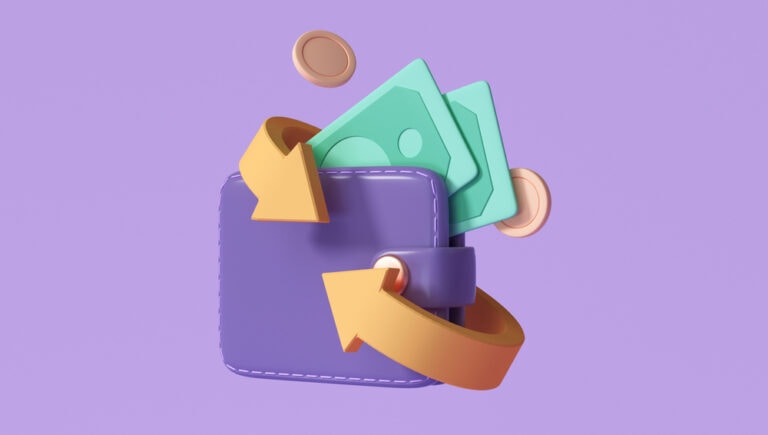What Are FHA Closing Costs? | How Much Are FHA Closing Costs? | Types of FHA Closing Costs | Can FHA Seller Concessions Cover FHA Closing Costs? | FAQs
| 💰 How Much Are FHA Closing Costs?
Closing costs for an FHA loan are typically 2-6% of the loan amount. These costs include required expenses like FHA-specific mortgage insurance premiums, plus other third-party fees that may be negotiable. |
FHA loans are a great option for people who want to own a home but may not qualify for a conventional mortgage because of poor or nonexistent credit history.
These borrowers — who are often part of low-income or moderate-income communities — may have trouble saving up for the traditional 20% down payment. FHA loans require only a 3.5% down payment and are available to applicants with credit scores as low as 580, or even lower.
However, it’s important to remember that FHA loans come with closing costs, just like conventional loans, and FHA borrowers should make sure they budget for their FHA closing costs.
What Are FHA Closing Costs?
In general, closing costs are fees that buyers and sellers pay to the various parties that help get the transaction across the finish line — including lenders, title companies, appraisers, attorneys, home inspectors, and many others.
FHA loans come with their own specific closing costs that can include fees from your FHA-approved lender and certain FHA-specific insurance premiums.
Your mortgage lender will give you a cost estimate when you apply for your FHA loan, and on closing day you’ll get a final total on your closing disclosure form. Your closing costs may vary based on your location, tax rates in your municipality, and your personal tax considerations.
How Much Are FHA Closing Costs?
FHA loan closing costs are typically 2–6% of the loan amount.
So if you’re buying a $200,000 home, you should budget $4,000 to $12,000 for your FHA loan closing costs. For a $400,000 home, you should budget $8,000 to $24,000 in closing costs.
Different lenders and third-party service providers charge different fees in different parts of the country, which accounts for the potentially wide spectrum of closing costs.
Can Closing Costs Be Included in Your FHA Loan?
Yes, you can often include your closing costs in your FHA loan! Simply ask your lender if you can roll your closing costs into your mortgage.
This gets you out of paying closing costs out of pocket, but keep in mind that you’re now paying interest on them. They’ll also slightly increase your monthly mortgage payment. Still, this can be a lifeline for buyers who find themselves short on cash at closing.
Types of FHA Closing Costs
| Type of Closing Cost | % You’ll Owe | Avg. Cost for a $300,000 Loan |
|---|---|---|
| Mortgage Insurance Upfront Premium | 1.75% | $5,250 |
| Lender Fees | 1-2% | $3,000-$6,000 |
| Prepaid Fees | 1% | $3,000 |
| Third Party Fees | 1% | $3,000 |
Mortgage Insurance Premiums (FHA Funding Fees)
FHA loans come with required FHA mortgage insurance premiums — often collectively referred to as FHA funding fees. Insurance premiums are the amount you pay to take out the policy.
We should note that this insurance protects your lender — not you— if you default on your mortgage.
There are two main types of mortgage insurance premiums:
- Mortgage Insurance Premiums (MIP): This annually adjusted charge is a percentage of the remainder of your mortgage, usually between 0.45% up to 1.05%. It’s included in your monthly mortgage payment.
- Upfront Mortgage Insurance Premium (UFMIP): This premium is 1.75% of your loan. If you’re short on cash at closing, you can typically roll this fee into your mortgage, but it will charge interest and slightly increase your monthly mortgage payments.
Lender Fees
Lender fees vary among different mortgage lenders. Talk to your FHA-approved lender about the fees they’re charging, and ask if they can be waived or reduced.
Some lender fees you can expect to be charged include:
- Application Fee: A nonrefundable, fixed fee for applying for the loan
- Document Preparation Fee: A fee for drafting or creating legal documents
- Origination Fee: A fixed fee for processing a loan
- Rate Lock Fee: A fee to “lock in” a fixed mortgage rate for a certain amount of time, no matter what else is happening on the market
- Underwriting Fee: A fee for taking on the financial risk of giving you a loan
Prepaid Fees
Prepaid fees are costs that you’ll need to pay in advance. Keep in mind that these can sometimes be shared between the buyer and seller. Typical prepaid fees include:
- Flood and Hazard Insurance Premiums: The amounts you pay in order to set up flood and hazard insurance
- Per-diem Interest: Charges for any daily interest that accrues between the closing date and the period of the first mortgage payment
- Prorated Real Estate Taxes: Property taxes that are split between buyer and seller depending on who was living on the property during the tax year
- Tax and Homeowners Insurance Escrow Deposits: Deposits and premiums that go into your escrow account in order to use it
Third-Party Fees
A home purchase involves more parties than the buyer, the seller, and the lender. These third-party fees cover everything those parties provide, from title services to the home appraisal and inspection, to notarization on closing day.
Some potential third-party fees include:
- Attorney fees
- Credit check fees
- Deed recording
- Flood zone certification
- Home appraisal
- Notary services
- Recording fees
- Title insurance premium
- Title search
These small fees can add up quickly, but the good news is that, when your FHA-approved lender provides you with an estimate of your closing costs, you can shop around for better rates on certain services, reducing your overall closing costs!
You may also be able to negotiate and reduce some of these third-party fees. It’s always worth asking.
Can FHA Seller Concessions Cover FHA Closing Costs?
Yes, sellers are allowed to pay a portion of the buyer’s closing costs when an FHA loan is involved.
However, FHA seller concessions for closing costs are capped at 6% of the sale price. That’s a pretty generous amount, but don’t assume you can get the full 6% from your seller.
Despite a slight slowdown, the housing market is still a strong sellers’ market. Most homes receive multiple offers and come off the market very quickly, so sellers don’t need to make concessions to clinch a sale. Still, it never hurts to ask during negotiations!
Navigating complex negotiations is hard enough, let alone in a sellers’ market. Bringing in an expert real estate agent early can help you know what kind of mortgage loan you need, which fees you might be able to waive or reduce, and what to ask for during negotiations.
Recommended Reading
Frequently Asked Questions about FHA Closing Costs
How can I avoid closing costs on an FHA loan?
Unfortunately, you can’t truly avoid closing costs on an FHA loan, but you can put off paying them for a bit by rolling them into your monthly mortgage payment. But keep in mind that means they will be accruing interest, so you’ll have to pay more in fees in the long term. Learn more about FHA closing costs and rolling them into your loan.
Are closing costs different for FHA vs conventional?
Yes, closing costs are different for FHA loans vs. conventional loans. Usually, FHA closing costs are higher than traditional mortgage loans, but they also allow the seller to make FHA seller concessions to pay more of the closing costs. If you play your cards right and you’re in the right market, FHA closing costs could be cheaper than conventional closing costs. Learn more about the types of FHA closing costs.
How do you get closing costs waived?
It’s pretty much impossible to get closing costs waived, but you can include them in your monthly mortgage payment so you don’t have to pay everything upfront. That does mean they will be adding to the interest you accrue on your mortgage loan. Learn more about FHA closing costs.
What are the downsides of a FHA loan?
There are some downsides of an FHA loan. FHA loans are more rigid and limited than conventional loans, and they require you to pay initial and ongoing mortgage insurance. Also, if you can’t afford to make a large down payment and decide to use an FHA loan, it could mean that you aren’t quite ready to take on the financial burden of a mortgage. Learn more about the types of FHA closing costs, including mortgage insurance premiums.



